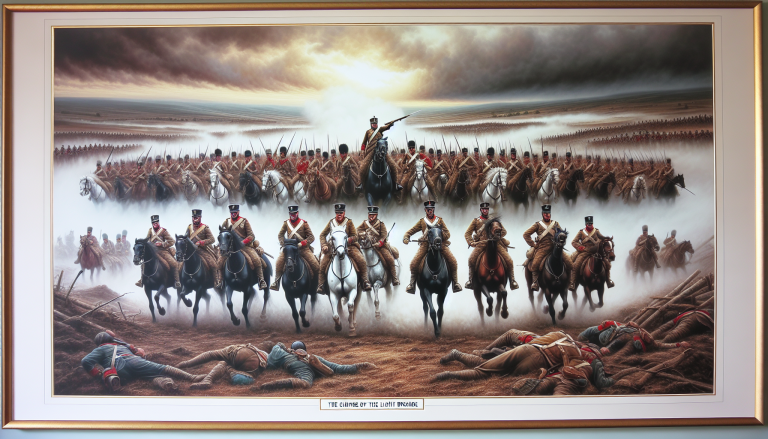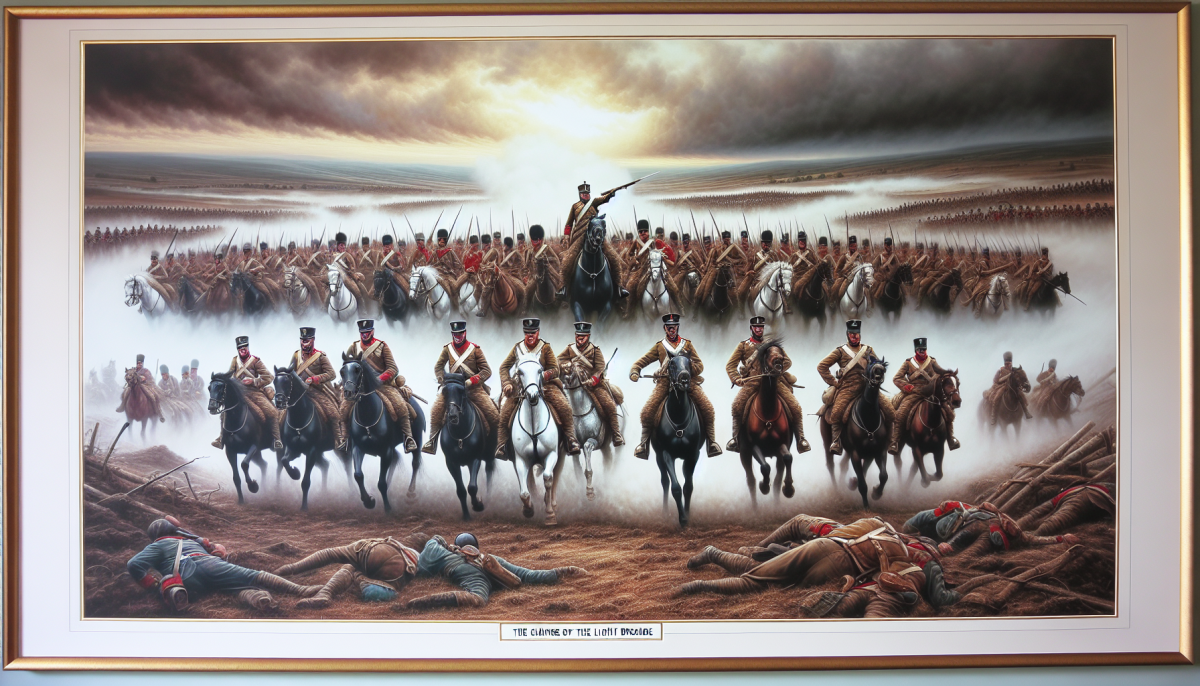The Charge of the Light Brigade: How to Futilely Beat a Dead Horse with Artillery and Spare Horses
Ah, the Charge of the Light Brigade—a splendid historical example of a blunder so monumental it has been used as the poster child for futile efforts. Picture this: it’s October 25, 1854, the Crimean War is raging, and a British cavalry unit is about to be sent on a wild goose chase of epic proportions. If “beating a dead horse” were an Olympic sport, this charge would have taken gold, silver, and bronze simultaneously.
The stage is set around the Valley of Death. No, not the Disney kind, but equally doom-laden. The British Commander-in-Chief, Lord Raglan, issues a beautifully vague written order—which, if misinterpreted by several ambitious officers wasn’t bad enough, commands a cavalry charge into a “well-defended valley” (read: hailstorm of Russian cannonballs). The recipient, Lord Lucan, gets confused, Lord Cardigan charges anyway, and the rest is a tragicomic masterpiece of military futility.
One might think that the phrase “beating a dead horse” originated from this event, given the horses were quite literally going to get beaten to a pulp chasing after an impossible objective. Alas, the phrase is older, but the Charge certainly is deserving of its titular spirit: trying to get something out of a lost cause by beating it harder until everyone is too exhausted to recognize the original point of senseless persistence.
The Blunder: From Vague Orders to Violent Catastrophe

Lord Raglan’s order essentially amounted to “Attack that enemy artillery if you can find it,” but what he wrote in the official note was naughty ennui wrapped in euphemism. According to the “Lost in Translation” school of military thought, the order was clear as mud. Lord Lucan, Commander of the Cavalry Division and Cardigan’s brother-in-law, interpreted this as a command to charge a different battery than what Raglan intended.
Imagine a boss telling you to “address the pressing issue” and you decide “the pressing issue” was your desk plant, not the annoying client on the phone. Only here, the desk plant is a line of heavily armed Russian cannons and your client is a swarm of bullets. The Light Brigade, famous for being the “light” brigade, therefore proceeded to bash their way into artillery fire. The horses, bless them, had nowhere to go but straight into the line of fire, repeatedly, like those arcade games where you throw money at a machine that never pays out.
Reports suggest the cavalry was galloping into a gauntlet of at least 20 Russian artillery pieces, entrenched infantry, and riflemen. Their hopes might have been lofty; however, the execution was the equivalent of saying “Let’s put turmeric on this burnt toast to make it better”—no amount of turmeric can fix burnt toast, much like no amount of cavalry can win a battle when facing annihilation head-on.
The Aftermath: Voices from the Valley of Failure
Alfred, Lord Tennyson, immortalized the debacle with his poem *The Charge of the Light Brigade*, transforming this military mess into an artful tribute to “honour” and “valour” amidst obvious stupidity. However, if we peek behind the poetic veil, the poem is really a sarcastic checkmark in the futile effort column:
> “Someone had blundered,” wrote Tennyson, delicately avoiding mentioning that the entire chain of command held degrees in baffling orders. The poem’s refrain, “Theirs not to reason why, / Theirs but to do and die,” succinctly captures the essence of pointless persistence. It’s a line so drenched in irony that it practically wants a standing ovation for blind obedience leading straight into a meat grinder.
Eyewitnesses and historians concur that many horses died that day—trampled, shot, or worn out from galloping into a firing squad. “Beating a dead horse” was not just metaphorical; this time, the horse was quite possibly dead or dying, and the cavalry seemed intent on proving it with as many charges as possible.
Futile or Committed? A Cavarly Dilemma
Was the charge an act of reckless bravery or a turning point in military history? Well, let’s not kid ourselves: it was a blunder with a capital “B.”
The word “futile” didn’t just describe the results; it was the ambient atmosphere. The brigade lost roughly 278 men, with many more wounded. The Russians, after what must have been a rather gratifying afternoon, easily repelled the attack. So futile was the mission, the decision-making process was later lampooned in newspapers and satirical cartoons across Britain.
One popular cartoon depicted Lord Lucan and Lord Cardigan riding into a brick wall labeled “Reality,” while Lord Raglan waves from a distant hill, holding a map, bewildered as to why he sent men on a suicide mission. The caption? “Well, at least they’re memorable.” A salient reminder that a famous blunder often carves its place into history far faster than a decisive victory.
Cartoons and Satire: Beating the Dead Horse to Shape Public Opinion
The Charge of the Light Brigade has been meme fodder for Victorian satirists ever since. Punch magazine, the 19th-century equivalent of Twitter but with more monocles, delighted in depicting the event as a comedy of errors so spectacular it was almost poetic:
– One brilliant cartoon showed a hapless officer desperately whipping an obviously exhausted horse labeled “Common Sense.”
– Another illustrated generals playing a game of “Pin the Blame on the Donkey,” a metaphorical representation of accountability dodging.
– Most amusingly, caricatures showed horses with speech bubbles saying, “I think I’m already dead, why insist on more?”
These cartoons underscored the public’s skepticism toward the leadership and the uselessness of the charge. They popularized the phrase “beating a dead horse” as a perfect encapsulation of the futile military mission that squandered bravery on pointless sacrifice.
Lessons Learned? Or Just Repeated Mistakes?
History is littered with futile efforts masked in gloss and glory, but the Charge shines bright (and red) as a warning about ignoring practicality in favor of spectacle. The phrase “beating a dead horse” perfectly sums it up: the Light Brigade’s persistence in charging a hopeless target was the granddaddy of futile endeavors.
In military circles, the phrase has become shorthand for “you’re twice as dead as anything can be, but sure, keep trying.” This particular event didn’t just teach the British Army that clearer communication might save lives; it popularized the notion that sometimes, no matter how many horses you whip, the outcome remains grim.
To their credit, at least the soldiers showed commitment. But commitment without clear goals is just a polite way of saying “massive blunder.” And when it’s played out as a cavalry charge straight into cannons, it’s also ridiculously funny, in a dark, galloping-horse kind of way.
Final Gallop
The Charge of the Light Brigade remains the shining example of what it means to futilely beat a dead horse—in both literal and metaphorical terms. There are few acts in history where bravery and blunder collide so explosively, like an over-ambitious knight charging a dragon that’s actually a dragon-shaped rock.
Next time someone accuses you of flogging a dead horse, just remember the valiant Light Brigade riding headlong into the Valley of Death, driven by orders so incomprehensible they could have been scribbled by a chicken with a quill. And smile at the tragic hilarity that sometimes, no matter what you do, the horse just isn’t getting up.
